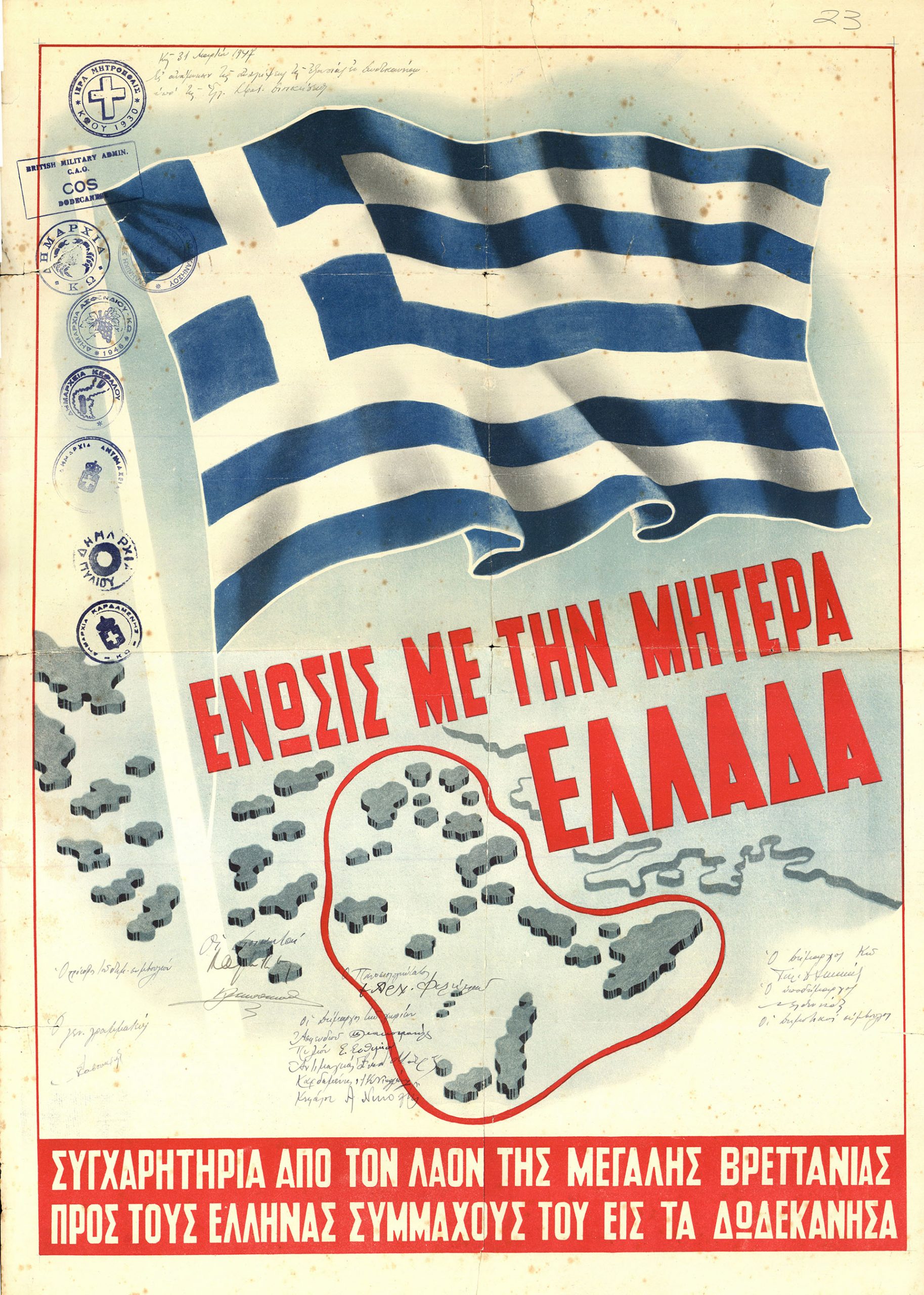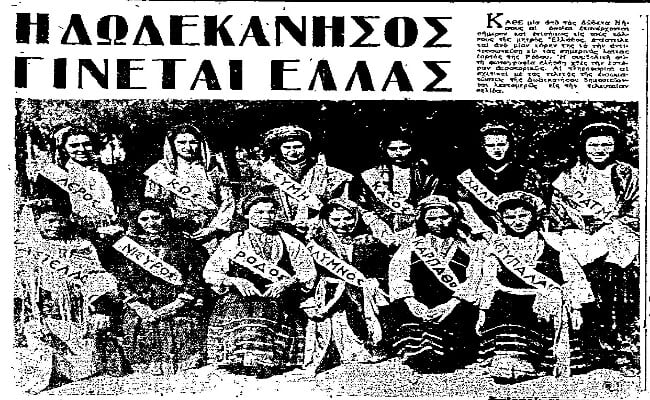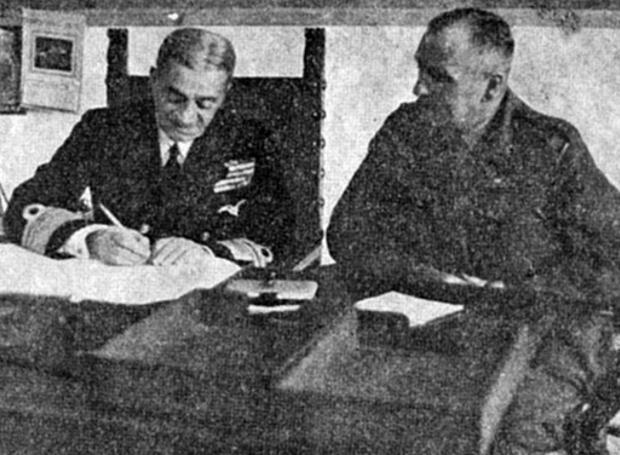HISTORY
HISTORY

Since antiquity, the 14 islands which constitute the archipelago of the Dodecanese, were bound by the fortune of the Greek Nation. However, it was not until 1947 that they were integrated into the national body and the Greek state.
Due to their geographical location, the Dodecanese were raided by the Persians, Saracens, Venetians, Genoese, Crusaders and Turks (Seljuks and Ottomans). In 1309 they were occupied by Knights Hospitaller and remained under their occupation until 1522, when they were occupied by the Ottoman Turks. Upon the beginning of the national liberation struggle of 1821, the Dodecanese revolted, but in 1830, along with Samos, they were once again under the rule of the Ottoman Empire, in exchange for Euboia, which was integrated into the free Greek state.

Congratulatory poster for the union of the Dodecanese with Greece (Archive of the Council of Elders of Symi).
In 1912, when the Italians occupied the Dodecanese, the hopes of their inhabitants were revived that soon the islands would be integrated into the Greek state. Thus, with the Treaty of Sevres on August 10, 1920, the Dodecanese were ceded to Greece, with the exception of Rhodes, which would remain under Italian rule. However, the unfortunate outcome of the Asia Minor campaign gave the Italians the opportunity to retreat and with the rise of Mussolini they tried to eliminate them. However, after the capitulation of the Italians in 1943, the Dodecanese came under German rule and, following the surrender of Hitler’s Germany in May 1945, they became a colony of Great Britain.
Also read: September 23, 1821 | The fall of Tripoli and the consolidation of the Revolution
This was the golden opportunity for the Dodecanese to integrate into the Greek state, which Greek diplomacy should not let go. It was a demand of the Greek people and a lot of Greek blood had been shed for the expulsion of the Germans from the Dodecanese. The issue would be finally resolved by the Peace Conference of the victorious powers of World War II, which would meet in Paris.
The then Prime Minister of Greece, Konstantinos Tsaldaris, said that he would put the acquisition of Northern Epirus and the Dodecanese, the settlement of the Greek-Bulgarian border on the negotiating table as national claims, while he intended to raise the issue of Cyprus to Great Britain. Of these four national claims, only the issue of the Dodecanese was successful, without any difficulties or complications.

Newspaper title of the time
The news about the integration of the Dodecanese in Greece was hailed with great enthusiasm, at a time when the country was in a civil war. The Peace Conference met in Paris from July 29 to October 11, 1946, where the Greek side also raised the issues of Northern Epirus and the settlement of the Greek-Bulgarian border, without success, as the US did not want to upset its ally, the Soviet Union, and the satellites of Albania and Bulgaria.
On February 10, 1947, the Peace Treaty with Italy was signed in Paris, according to which the Dodecanese were ceded to Greece, while Italy was obliged to compensate Greece with 105 million dollars. Due to the obsession of the Soviet side, the text provided that the islands would remain demilitarized, something that Turkey abusively invoked after 1974. From the Turkish interpretation of the text of the Greek-Italian treaty of 1947, along with the Italian-Turkish agreements of 1932, the issue of the “gray zones” raised by Ankara after the Imia Crisis in 1996 will also arise.
The handover ceremony of the Dodecanese to Greece by the British authorities took place on March 31, 1947 in Rhodes in a festive atmosphere. The first commander of the Dodecanese was Vice Admiral Pericles Ioannidis, with academic and judge Michael Stasinopoulos, later president of the Hellenic Republic, as his political advisor. The official integration ceremony took place on March 7, 1948 and in 1955 the Dodecanese became a prefecture with Rhodes as their capital.

Rear Admiral Pericles Ioannidis signs the protocol of surrender of the Dodecanese.
Also read: October 9, 1912 | Greek fleet liberates Lemnos and seizes control of the Dardanelles – Photo Gallery
With information from: Sansimera.gr
NEWSLETTER SUBSCRIPTION
Armenian Genocide Remembrance Day
On this day, 109 years ago, the genocide of the Armenian people by the Ottoman Empire began, with April 24 being the day of…
April 10, 1826 | The heroic Exodus of Messolonghi
Three years after the failed attempt of Kioutachis and Omer Vryonis to capture Messolonghi, the Sultan had a new plan.
Hellenic Army General Staff (HAGS) | Events for the 83rd Anniversary of the Battle of the Forts
On Sunday, April 7, 2024, the 83rd anniversary of the Battle of the Forts (April 6-9, 1941) was celebrated at “LISSE”, “RUPEL”,…
STORE project | AI-assisted optronics to increase combat perception capabilities
The European Commission signed the Grant Agreement for the launch of the STORE (Shared daTabase for Optronics image Recognition and…
The FEDERATES project | Developing Europe’s first MSaas ecosystem
On 21 March 2024, the first Italian Workshop on the FEDERATES project of the European Defence Fund was held.
Cyprus | Jordan mission to reinforce aerial firefighting means
Two firefighting helicopters with their 18-member crew arrived in Cyprus from Jordan to support the Republic of Cyprus’ aerial firefighting.
Saint George | The Patron Saint of the Army and the Infantry
Saint George is one of the most prominent Saints of the Christian religion, not only of the Eastern Orthodox Church, but also of all…
QinetiQ | UK’s first Manned – Unmanned aircraft Teaming
QinetiQ has successfully trialled the UK’s first Manned-Unmanned Teaming (MUM-T) demonstration between a crewed aircraft and a drone.
Lambda Automata | Investment in UAV technology
Greek Lambda Automata has recently announced a major development that will strengthen its position in the defence industry.



















0 Comments